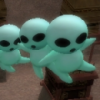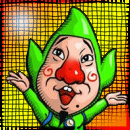1. When Daphnes talks about Zelda's ancestors being ordered to keep the Triforce safe, does it mean literally? As in, the gods came down and said "Would you mind looking after our stuff for us?"
The Japanese gives no reason to believe it is not literal.
2. When Link is made the "Hero of Winds", was that whole thing about Link being "bestowed" the power of the gods added in by NoA?
Yes, NoA said it was "bestowed" upon him while the Japanese said it "dwelled" within him.
3. When Zelda says in OoT that Ganondorf could not control the power of the gods, is she referring explicitly to the whole Triforce or just the ToP? Or is that up for interpretation?
She uses the term "kami no chikara" which literally means "power of the gods". So the Japanese doesn't help any here.
1) At the end of OoT, where Zelda says that Ganondorf "could not control the power of the gods", I have realised that the word "control" has a double-meaning in the English language. It can mean "to use" or it can mean "to prevent from acting of its own accord". Jacen, does the Japanese translation provide a more specific meaning as to what "control" means?
The Japanese word has this double-meaning as well. It could mean "to govern" or "to have mastery over" and it could also mean "to keep in check", "to suppress", or "to restrain".
2) Unlike most people here, I believe that Twilight Princess does not refer to the Sacred Realm, because the "holy land" was stated in two separate quotes to be Hyrule. But I wonder, is the Sacred Realm a title in the Japanese translation? Is there anything in the grammar that distinguishes the Sacred Realm in other Zelda games from the "holy land" in Twilight Princess? Just curious.
As far as I could tell by quickly looking back at Jumbie's translations, referring to "Sacred Land Hyrule" is the only way TP differs from every other game in how it uses the Japanese word for the Sacred Realm, "seichi".















